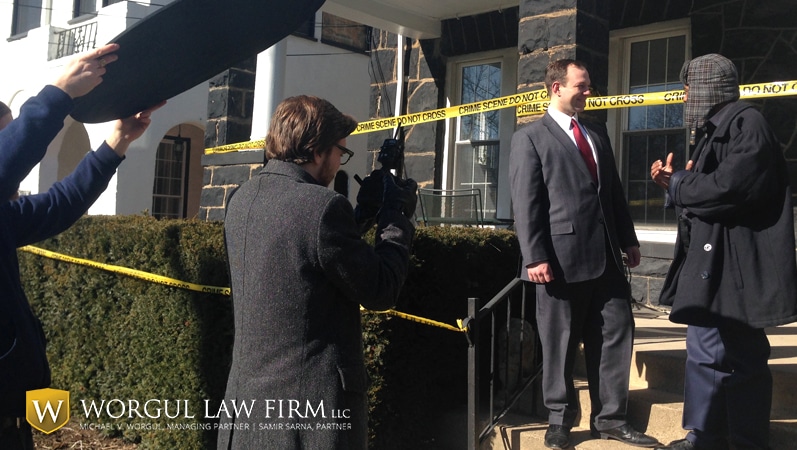Victim of an Illegal Search & Seizure in PA? We Can Help
The constitutions of the United States and the Commonwealth of Pennsylvania provide citizens with many protections against overreaching government power. One of the most important is the protection of all citizens from unreasonable searches and seizures. The search and seizure laws that have developed through Supreme Court decisions on the national and state levels work to ensure that you are protected from baseless searches by the police.
If you are searched illegally, then search and seizure laws can prevent evidence discovered during that illegal search from being used against you in court. An experienced Pittsburgh criminal defense attorney can recognize if you have been the victim of an unreasonable search or seizure and work to prevent illegally obtained evidence from being used against you.
Call Worgul, Sarna & Ness, Criminal Defense Attorneys, LLC, today at (412) 281-2146 to find out how we can help you.

Jump to a Section:
- Federal Search & Seizure Laws
- Pennsylvania Search & Seizure Laws
- Exceptions to the Search Warrant Requirement
- Exclusionary Rule
- US vs. Pennsylvania Laws
- Good Faith Exception
- Contact Us
Federal Search & Seizure Laws
The basis for all search and seizure protections in the United States is found in the Fourth Amendment to the United States Constitution, which reads:
“The right of the people to be secure in their persons, houses, papers, and effects, against unreasonable searches and seizures, shall not be violated, and no Warrants shall issue, but upon probable cause, supported by Oath or affirmation, and particularly describing the place to be searched, and the persons or things to be seized.”
The Fourth Amendment establishes that the government cannot search citizens without reason. If a search is to be conducted, it must be done after a search warrant has been obtained, once the government has proven probable cause for the need to search specific areas for specific items.
Pennsylvania Search & Seizure Laws
The Constitution of the Commonwealth of Pennsylvania provides similar protections from government searches and seizures. The protections are outlined in Article I, Section 8, which states:
“The people shall be secure in their persons, houses, papers, and possessions from unreasonable searches and seizures, and no warrant to search any place or to seize any person or things shall issue without describing them as nearly as may be, nor without probable cause, supported by oath or affirmation subscribed to by the affiant.”
As with the U.S. Constitution, the citizens of Pennsylvania are protected from “unreasonable searches and seizures,” and a search warrant requires probable cause to search for specifically described items.
Exceptions to the Search Warrant Requirement in Pennsylvania
While both constitutions impose a search warrant requirement, the United States Supreme Court has created exceptions to the search warrant requirement where individual rights have been balanced against the government’s interests. The following are some of the most notable exceptions to the search warrant requirement:
Consent
If an individual is reasonably believed to have given the authority consent to a search, then no search warrant is required.
Plain View
When evidence can be viewed in the open, no search warrant is required. The plain view exception does not include the use of vision enhancement devices such as binoculars. Additionally, there is no plain view exception if a law enforcement officer is in a location illegally.
Searches Incident to Arrest
If a law enforcement officer is conducting a lawful arrest, a search of the person and the area around the person can be conducted without a search warrant.
Automobile Searches
Law enforcement can search a vehicle without a search warrant if they have probable cause to believe it contains evidence of a crime. Warrantless searches are allowed because vehicles are designed to be mobile, and requiring a warrant could cause the evidence to be lost.
Exigent Circumstances
This exception allows law enforcement officers to conduct a search or enter premises without a warrant in situations where there is an emergency. The emergency could be where lives are in danger, evidence is in danger of being destroyed, or a suspect could potentially escape.
The Exclusionary Rule in Pennsylvania Criminal Defense
Illegally obtained evidence can—and should—be thrown out. The Fourth Amendment of the U.S. Constitution protects individuals from unlawful searches and seizures by the government. To ensure this right has real meaning, the United States Supreme Court developed a powerful safeguard known as the exclusionary rule.
The exclusionary rule prevents prosecutors from using evidence gathered in violation of your constitutional rights. If law enforcement conducts an illegal search or seizure, any evidence they obtain can be ruled inadmissible in court—effectively neutralizing its use in a criminal trial.
Example: How the Exclusionary Rule Works
Imagine the police conduct an unlawful search of your home and find drugs without a valid warrant or probable cause. If your Fourth Amendment rights were violated, the court can exclude that drug evidence. Without it, the prosecution’s case may collapse—leading to a dismissal or acquittal.
The “Fruit of the Poisonous Tree” Doctrine
An important extension of the exclusionary rule is the fruit of the poisonous tree doctrine. This principle bars not only the original evidence obtained through illegal means but also any new evidence that stems from that unconstitutional act.
For example, if police illegally search your home and find a receipt leading them to a storage locker containing more drugs, both the home search and the drugs in the locker may be ruled inadmissible. In this case:
- The illegal search = the poisonous tree
- The evidence discovered afterward = the fruit
This doctrine reinforces that constitutional violations taint the entire investigative process, not just the initial act.
Federal vs. Pennsylvania Search & Seizure Laws
Although the U.S. Constitution sets a baseline for search and seizure protections, states may offer even stronger privacy rights under their own constitutions. Pennsylvania is a clear example of this.
Article I, Section 8 of the Pennsylvania Constitution provides enhanced privacy protections beyond federal standards. The Pennsylvania Supreme Court has repeatedly emphasized the state’s “strong notion of privacy,” and has ruled in favor of broader protections in cases such as:
- Suspicionless drug testing of school students
- Warrant requirements for access to personal bank records
These rulings show that Pennsylvania courts may exclude evidence even when federal law would allow it.
No Good Faith Exception in Pennsylvania
One of the most critical differences between federal and Pennsylvania law is the treatment of the good faith exception to the exclusionary rule.
- Federal Law: Evidence may still be admitted if police acted in good faith—believing their search warrant was valid, even if it later proves defective.
- Pennsylvania Law: The good faith exception does not apply. The Pennsylvania Supreme Court has made it clear that Article I, Section 8 does not permit unlawfully obtained evidence, even if officers believed their actions were lawful.
This means your defense attorney in Pennsylvania has more power to challenge illegally obtained evidence, and potentially have it suppressed entirely.

How Our Pittsburgh Search and Seizure Attorneys Can Help
The ability of citizens to remain free from unreasonable government searches and seizures is an extraordinarily important aspect of the constitutions for both the United States and the Commonwealth of Pennsylvania. The differences between search and seizure laws for the United States and Pennsylvania mean that you will want an experienced Pennsylvania criminal defense attorney on your side to ensure your constitutional rights are properly defended.
Our criminal defense lawyers at Worgul, Sarna & Ness, Criminal Defense Attorneys, LLC have represented hundreds of clients and understand the damage that can be done when your rights are violated, which can lead to serious criminal charges. Call (412) 281-2146 for a free and confidential consultation with a Pittsburgh criminal defense attorney today.








